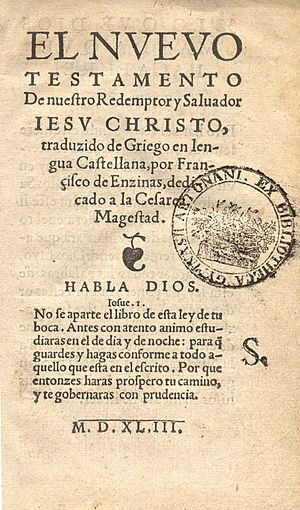Francisco de Enzinas facts for kids
Francisco de Enzinas (born around 1518, died 1552), also known as Francis Dryander, was a smart scholar, writer, and translator from Spain. He was also a Protestant reformer, meaning he wanted to change some things about the Christian church at that time. He is famous for translating the New Testament into Spanish.
Contents
Early Life and Learning
Francisco de Enzinas was born in Burgos, Spain, probably on November 1, 1518. He was one of ten children of Juan de Enzinas, a very successful wool merchant. His stepmother, Beatriz de Santa Cruz, came from a wealthy family.
Around 1536, Francisco was sent to the Low Countries (modern-day Belgium and Netherlands) to learn about business. But in 1539, he joined the Collegium Trilingue at Louvain. There, he became very interested in humanist studies, which was a popular way of learning promoted by scholars like Desiderius Erasmus. He also met important people like the Polish reformer Jan Łaski.
Francisco's brother, Diego de Enzinas, also studied with him. They worked together on a Spanish version of a religious book by John Calvin and a text by Martin Luther. Sadly, Diego died in 1547 because of his Protestant beliefs.
Translating the New Testament

In 1541, Enzinas went to the University of Wittenberg to study with Philip Melanchthon, a famous Greek scholar. While living with Melanchthon, Enzinas finished his big project: translating the New Testament into Spanish.
He took his translation to Antwerp to be printed in 1543. Enzinas dedicated his Spanish New Testament to Emperor Charles V. He even gave the first printed copy to the Emperor in Brussels. However, the Emperor's confessor, Pedro de Soto, ordered Enzinas's arrest. They tried to take all the printed copies of the New Testament, but they only partly succeeded.
Enzinas managed to escape from prison in Brussels in February 1545. He went back to Wittenberg and wrote a book about his adventures, called Mémoires. In the same year, he also published a book about the murder of his friend, Juan Díaz, which became very popular.
Enzinas's New Testament translation was very important. It influenced later Spanish Bible translations, especially the Reina-Valera version, which is still widely used by Spanish-speaking Protestants today.
Life in England
In March 1548, Enzinas married Margaret Elter, who was also a religious exile. Soon after, they moved to England. They were encouraged by Martin Bucer, another reformer, because England was safer for Protestants under King Edward VI.
Thomas Cranmer, an important church leader in England, welcomed them. He soon asked Enzinas to teach Greek at Cambridge. Enzinas also tutored one of the sons of Catherine Willoughby, the Duchess of Suffolk. The Duchess was a Protestant and had Spanish family connections.
Final Years on the Continent
At the end of 1549, Enzinas left his wife and new baby daughter in England. He went to the Continent to print more Spanish translations of classical books by authors like Lucian, Livy, and Plutarch. He preferred to work with printers he knew and trusted there.
In June 1550, his family joined him in Strasbourg. There, he set up a small publishing house focused on Spanish books. For the next two and a half years, he published many classical works and Old Testament books in Spanish. A second daughter was born in 1551.
Enzinas was close to finishing his biggest project: a complete Bible translation. However, he died before it could be printed. He passed away on December 30, 1552, from the plague in Strasbourg. His wife, Margaret Elter, died shortly after in February 1553. Their two daughters, Margarita and Beatriz, became wards of the city.
Books Published After His Death
Enzinas's Mémoires were published in French after his death in 1558. They have since been translated into German, French, Spanish, and Dutch.
His collected letters were published in 1995. These letters show his conversations with important religious figures, students, rulers, and printers of his time, like Philip Melanchthon, Heinrich Bullinger, Martin Bucer, and John Calvin.
See also
 In Spanish: Francisco de Enzinas para niños
In Spanish: Francisco de Enzinas para niños
 | Lonnie Johnson |
 | Granville Woods |
 | Lewis Howard Latimer |
 | James West |

